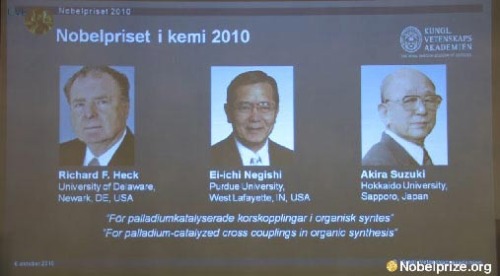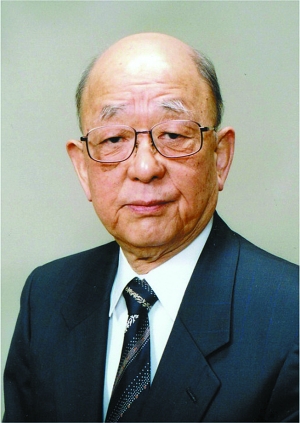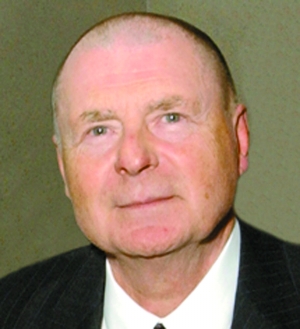 Three scientists from the United States and Japan share the Nobel Prize in Chemistry
Three scientists from the United States and Japan share the Nobel Prize in Chemistry 
80-year-old Professor Emeritus of Suzuki, Hokkaido University, Japan.

Genki Hitomi was born in 1935 in Changchun, China.

Heck, an American who shared the Nobel Prize with Japanese scientists. 79 years old.
If(picResCount>0){ document.getElementById("picres").style.display="block"; document.write("
"); }
***Report on October 7 The Royal Swedish Academy of Sciences announced on the 6th that American scientist Richard Heck, Japanese scientist Negishi Kiyoshi and Suzuki Zhang jointly won the 2010 Nobel Prize in Chemistry. The Chemistry Awards Review Committee said that the results of the three studies provide chemists with "exquisite tools."
Palladium-catalyzed cross-coupling reaction
At the press conference held by the Royal Swedish Academy of Sciences, Normarck, Permanent Secretary of the Royal Swedish Academy of Sciences, first read out the list of winners. He said Heike, Negishi Kiyoshi and Suzuki chapter made outstanding contributions in the research field of "palladium-catalyzed cross-coupling reaction", and its research results enable humans to effectively synthesize complex organic matter.
Subsequently, the Nobel Prize-winning Chemistry Committee **Trend and the judge Bakwar introduced the main findings of the three winners.
They say that in order to make complex organic materials, carbon atoms need to be brought together through chemical reactions. However, carbon atoms themselves are very stable and are not prone to chemical reactions. One idea to solve this problem is to make carbon chemistry more lively and easier to react by certain methods. Such methods can effectively produce a lot of simple organic substances, but when chemists try to synthesize more complex organic substances, there are often a lot of useless substances generated, and the research results of Heike, Negishi Kajiki, and Suzuki chapter solved this problem. A problem.
Provide chemists with sophisticated tools
The two judges said that Heike, Negishi Kiyoshi and Suzuki Zhang discovered through experimentation that carbon atoms could be linked to palladium atoms and undergo a series of chemical reactions. This technology allows chemists to produce the complex compounds they need precisely and efficiently. At present, the "palladium-catalyzed cross-coupling reaction" technology has been widely applied in the fields of scientific research, pharmaceutical production, and electronics industry.
The jury found that the research results of the three people provide chemists with "exquisite tools" that greatly increase the possibility of synthesizing complex chemical substances.
The jury member introduced that Heck was the first to discover in 1972 that with palladium catalysis, carbon atoms could approach each other to a distance where they could react without using high temperature and high pressure; Negishi added this theory in 1977 and Suzuki in 1979, Expand to more organic molecules. The jury found that the three scientists created "one of the most complex tools ever used."
One-day winners were born in Changchun
Heike, Negishi, and Suzuki are 79, 75, and 80 years old. Although they won the same award for the same topic, they did not work together or cooperate.
Heck was born in Springfield, USA, in 1931 and is currently an emeritus professor at the University of Delaware. Gen Kyung-Yi was born in Changchun, China in 1935. He now lives in the United States but still maintains Japanese nationality. He is currently a professor at Purdue University in the United States. Suzuki Zhang was born in Hokkaido, Japan in 1930 and is currently an Honorary Professor at Hokkaido University. The three of them will share the 10 million Swedish kronor (about 1.46 million US dollars) Nobel Prize in Chemistry. (Xinhua News Agency)
close up
Received the winning call at 5 in the morning
At 11:57 p.m. on the 6th (17:57 p.m. Beijing time), according to the usual practice, the jury's telephone connection was on the root bank of the east coast of the United States.
The Swedish television reporter took the lead to ask what he was doing at the time of the award, and Negishi answered and fell asleep at midnight the previous day. At 5 a.m., he received a phone call and said, "I'm sleeping well." After "waking up", Negishi said he was "extremely happy." A jury member said that before the press conference, three winners were contacted. At that time, when he was in the Philippines, he was initially "surprised" and soon returned to calm.
Although the three people are old, they are in good health and are willing to participate in the award ceremony held in Sweden on December 10th. Heike, Negishi, and Suzuki are 79, 75, and 80 years old respectively.
At the final stage of the press conference connection, the reporter focused on the application prospects of the "palladium-catalyzed cross-coupling reaction." Negishi said that the achievements of this project can be applied in many fields, or it can be used to create new drugs, but "I don't know what that would be."
Doubt
Palladium as "Medium" Coupling Carbon
Carbon atoms are chemically inert and do not want to combine with each other. How can these lazy carbon atoms come to life so that they can be put together?
One hundred years ago, people had thought of the solution. French scientist Grignard invented a reagent that uses magnesium atoms to force carbon atoms to two electrons and make carbon atoms become active. This was a very important achievement that enabled Grignard to win the 1912 Nobel Prize in Chemistry.
However, such methods have great limitations in the synthesis of complex macromolecules. People cannot control the behavior of the active carbon atoms, and the reaction produces some useless by-products. In the process of producing macromolecules, the by-products are generated very much and the reaction efficiency is low. Using palladium as a catalyst can solve this problem. Palladium atoms act like "matchmakers", attracting different carbon atoms to their side, making the distance between carbon atoms very close, and easy to combine - that is, "coupling," while the palladium atom itself does not participate in the binding. Such a reaction does not require the activation of carbon atoms to a very active degree, with fewer by-products, more accurate and more efficient.
Reflection
"If a scientist proposes a genius idea in Russia, our bureaucrats will put it into the coffin."
- The late Russian scientist Gutenberg
Bureaucracy hurts Russian scientific research?
Medvedev criticizes mistakes in Russian talent policy
Russian scientists Heim and Novoshorov of the University of Manchester in the UK won the 2010 Nobel Prize in physics for their graphene research on the 5th.
Both were born in Russia, graduated from the Moscow Institute of Technology, and worked in Moscow for scientific research. Later they went to the Netherlands and the United Kingdom to teach at the University of Manchester. Russian President Dmitry Medvedev criticized the Russian government for not offering attractive conditions to young scholars after graduation, leading to brain drain. “We need to work hard so that our genius will not go abroad,†said Medvedev. “Our experimental research base has been seriously outdated and has not been developed in recent years (research base).â€
Indukayev, who is engaged in the research of nanotechnology and applied physics in Russia, believes that although the Soviet education model allows researchers to have a higher theoretical level and experimental ability, “the lack of capital and modern equipment, poor working and living environment†has forced some Russian scientists left the country. Last year, the late Russian scientist Gutzborg, who won the Nobel Prize in physics in 2003, criticized the existence of bureaucracy and improper use of funds in the Russian academic community. He said: "If a scientist proposes a genius idea in Russia, our bureaucrats will put it into the coffin."